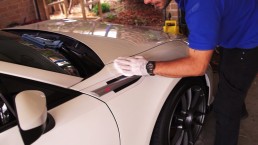In an era where vehicle safety standards have improved such that anything less than a 5-Star rating is generally considered unacceptable, it may come as a surprise that the 2015+ Ford Mustang GT has received just 2 Stars – the lowest score from a mainstream car manufacturer in 9 years!
While the car receives a 72% or “ADEQUATE” rating for adult occupants, and 64% “MARGINAL” rating for pedestrian safety, the Euro NCAP Report outlines significant inadequacies in the areas of Child Occupant and Safety Assist, with just 32% and 16% respectively.

The passenger compartment of the Mustang remained stable in the frontal offset test. Dummy readings indicated good protection of the knees and femurs of the driver and passenger dummies. Analysis of the dummy data showed that the driver’s head had ‘bottomed out’ the airbag i.e. there was insufficient pressure in the airbag to prevent the head from contacting the steering wheel through the deflated airbag material. The head of the passenger dummy also bottomed out the airbag against the dashboard, owing to insufficient inflation of the airbag and inadequate restraint for larger statures by the front passenger seatbelt load-limiter. The scores of both the driver and passenger were penalised for the airbag performance.
In the full-width rigid barrier test, protection of the driver was good apart from the chest, protection of which was adequate. However, the rear seat passenger slipped under the lap portion of the seatbelt (a phenomenon known as ‘submarining’) and the score for the knee, femur and pelvis body region was penalised and protection was rated as poor. Protection of the chest was also rated as poor as the rear seatbelt (which has neither pre-tensioners nor load-limiters) showed an excessively high tensile force in the test. Dummy readings of head deceleration indicated weak protection of the head for the rear passenger.
In the side barrier test, the Mustang scored full points with good protection of all critical body areas. Even in the more severe side pole test, protection of the chest was adequate and that of other body regions was good. Tests on the front seats and head restraints demonstrated a marginal level of protection against whiplash injury in the event of a rear-end collision. A geometric assessment of rear seats indicated poor whiplash protection in these seating positions. The current Mustang is not equipped with an autonomous emergency braking (AEB) system, which would have provided greater whiplash protection. However, Ford have indicated that the next version of the Mustang will have AEB.
EURO NCAP also notes that customers who ordered their cars after May will receive an updated vehicle, equipped with Pre Collision Assist (including Pedestrian Detection, Forward Collision Warning and Autonomous Emergency Braking) and Lane Keeping Aid.
Check out more Reviews by Boosted Media
January 21, 2017
Christian Von Koenigsegg on FREEVALVE Technology
November 6, 2014
Body Armour 9H – Ceramic Paint Protection
July 5, 2014



